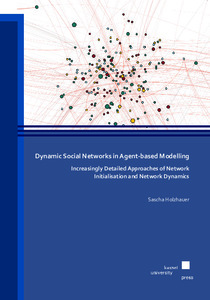| dc.date.accessioned | 2023-05-24T08:55:34Z | |
| dc.date.available | 2023-05-24T08:55:34Z | |
| dc.date.issued | 2017 | |
| dc.identifier | doi:10.19211/KUP9783737602631 | |
| dc.identifier.isbn | 978-3-7376-0263-1 (e-book) | |
| dc.identifier.uri | urn:nbn:de:0002-402637 | |
| dc.identifier.uri | http://hdl.handle.net/123456789/14747 | |
| dc.description | Zugleich: Dissertation, Universität Kassel, 2016 | |
| dc.language.iso | eng | |
| dc.publisher | kassel university press | |
| dc.rights | Urheberrechtlich geschützt | |
| dc.rights.uri | https://rightsstatements.org/page/InC/1.0/ | |
| dc.subject.ddc | 330 | |
| dc.title | Dynamic Social Networks in Agent-based Modelling. Increasingly Detailed Approaches of Network Initialisation and Network Dynamics. | eng |
| dc.type | Buch | |
| dcterms.abstract | Agent-based modelling enables the explicit representation of entities and their interaction with each other and the environment, and so it became an important method to study complex systems. Social networks form an important part of agent-based social simulation, as they define the topology of agent interaction. This dissertation initially identifies important properties of social networks and their dynamics and reviews their representation in agent-based models of relevant domains. A classification of levels of detail for the network modelling components initialisation, dynamics of networks, and dynamics on networks is proposed and guides the identification of deficits. A formal, iterative evaluation framework is developed to quantitatively assess network modelling approaches under a set of weighted criteria (representativity, adjustability, validity, and efficiency). The framework is applied to an abstract model of opinion dynamics and to an empirically grounded model of social influence. A lifestyle-specific network survey is designed, conducted, and analysed and helps to ground the evaluation of the network modelling’s representativity on empirical data. The study finds significant differences of degree and distance distributions as well as in the composition of ego networks between lifestyles. New network modelling approaches are developed to account for requirements in agent-based models such as agent-type specific link preferences, degree and distance distributions, community structures, and interaction dynamics. The comparison of simple to elaborated network modelling for the application models shows a significant impact on simulation results, highlighting the need for informed decisions about suitable approaches. | eng |
| dcterms.accessRights | open access | |
| dcterms.creator | Holzhauer, Sascha | |
| dcterms.dateAccepted | 2016-10-18 | |
| dcterms.extent | xxii, 392 Seiten | |
| dc.contributor.corporatename | Kassel, Universität Kassel, Fachbereich Wirtschaftswissenschaften | |
| dc.contributor.referee | Andreas, Ernst (Prof. Dr.) | |
| dc.contributor.referee | Flache, Andreas (Prof. Dr.) | |
| dc.publisher.place | Kassel | |
| dc.relation.isbn | 978-3-7376-0262-4 (print) | |
| dc.subject.swd | Soziales Netzwerk | ger |
| dc.subject.swd | Komplexes System | ger |
| dc.subject.swd | Dynamisches System | ger |
| dc.subject.swd | Computersimulation | ger |
| dc.subject.swd | Mehragentensystem | ger |
| dc.type.version | publishedVersion | |
| kup.iskup | true | |
| kup.price | 69,00 | |
| kup.subject | Wirtschaftswissenschaft | |
| kup.typ | Dissertation | |
| kup.institution | FB 07 / Wirtschaftswissenschaften | |
| ubks.nodoigen | true | |
| ubks.epflicht | true | |


